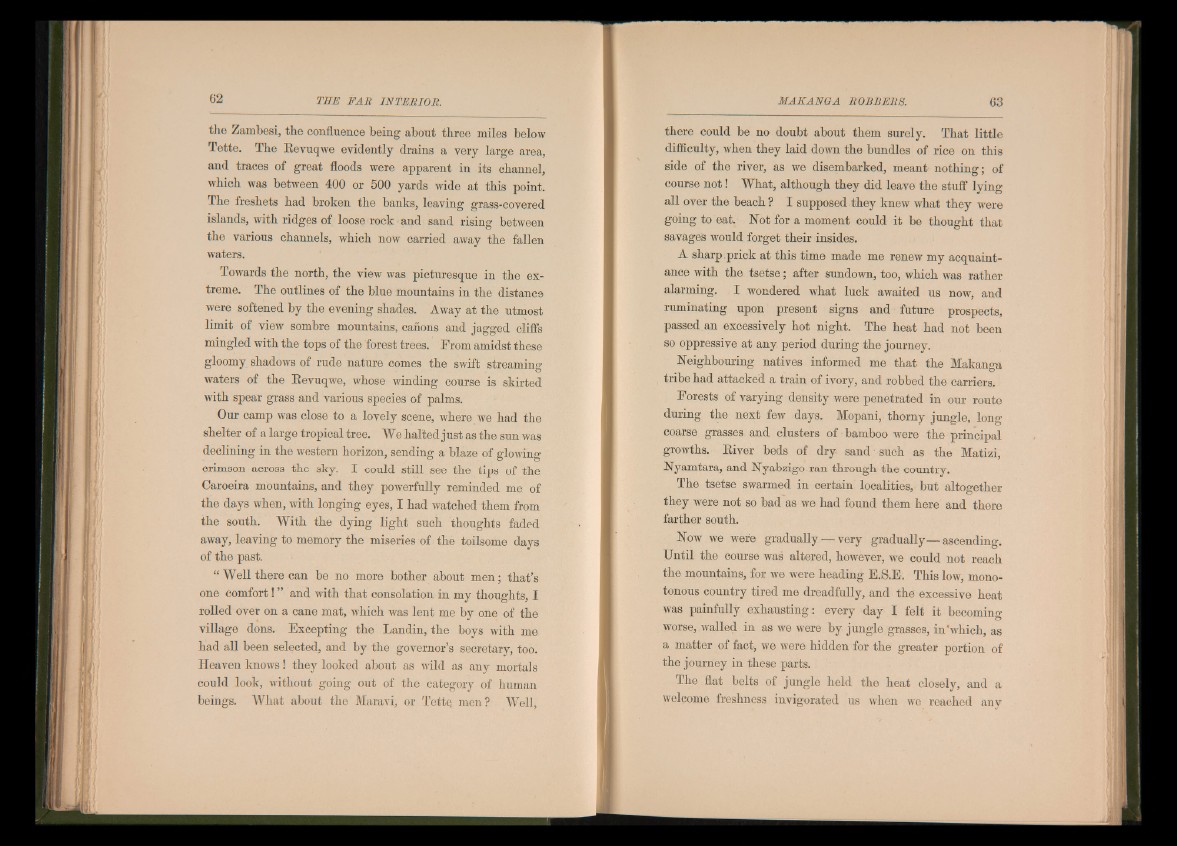
the Zambesi, the confluence being about three miles below
Tette. The Revuqwe evidently drains a very large area,
and traces of great floods were apparent in its channel,
which was between 400 or 500 yards wide at this point.
The freshets had broken the banks, leaving grass-covered
islands, with ridges of loose rock • and sand rising between
the various channels, which now carried away the fallen
waters.
Towards the north, the view was picturesque in the extreme.
The ontlines of the blue mountains in the distance
were softened by the evening shades. Away at the utmost
limit of view sombre mountains, canons and jagged cliffs
mingled with the tops of the forest trees. From amidst these
gloomy shadows of rude nature comes the swift streaming
waters of the Revuqwe, whose winding course is skirted
with spear grass and varions species of palms.
Our camp was close to a lovely scene, where we had the
shelter of a large tropical tree. We halted just as the sun was
declining in the western horizon, sending a blaze of glowing
crimson across the sky. I could still see the tips of the
Caroeira mountains, and they powerfully reminded me of
the days when, with longing eyes, I had watched them from
the south. With the dying light such thoughts faded
away, leaving to memory the miseries of the toilsome days
of the past.
“ Well there can be no more bother about men; that’s
one comfort! ” and with that consolation in my thoughts, I
rolled over on a cane mat, which was lent me by one of the
village dons. Excepting the Landin, the boys with me
had all been selected, and by the governor’s secretary, too.
Heaven knows! they looked about as wild as any mortals
could look, without going out of the category of human
beings. What about the Maravi, or Tette. men? Well,
there could be no doubt about them surely. That little
difficulty, when they laid down the bundles of rice on this
side of the river, as we disembarked, meant nothing; of
course n o t! What, although they did leave the stuff lying
all over the beach ? I supposed they knew what they were
going to eat. Not for a moment could it be thought that
savages would forget their insides.
A sharp , prick at this time made me renew my acquaintance
with the tsetse; after sundown, too, which was rather
alarming. I wondered what luck awaited us now, and
ruminating upon present signs and future prospects,
passed, an excessively hot night. The heat had not been
so oppressive at any period during the journey.
Neighbouring natives informed me that the Makanga
tribe had attacked a train of ivory, and robbed the carriers.
Forests of varying density were penetrated in our route
during the next few days. Mopani, thorny jungle, long
coarse grasses and clusters of bamboo were the principal
growths. River beds of dry sand such as the Matizi,
Nyamtara, and Nyabzigo ran through the country.
The tsetse swarmed in certain localities, but altogether
they were not so bad as we had found them here and there
farther south.
Now we were gradually — very gradually—ascending.
Until the course was altered, however, we could not reach
the mountains, for we were heading E.S.E. This low, monotonous
country tired me dreadfully, and the excessive heat
was painfully exhausting: every day I felt it becoming
worse, walled in as we were by jungle grasses, in ’which, as
a matter of fact, we were hidden for the greater portion of
the journey in these parts.
The flat belts of jungle held the heat closely, and a
welcome freshness invigorated us when we reached any